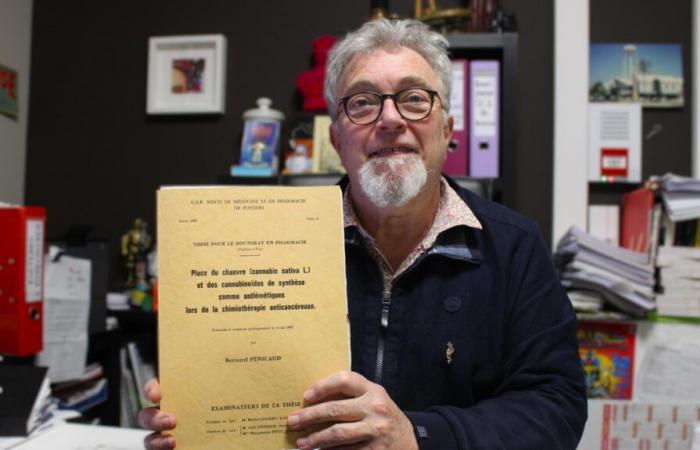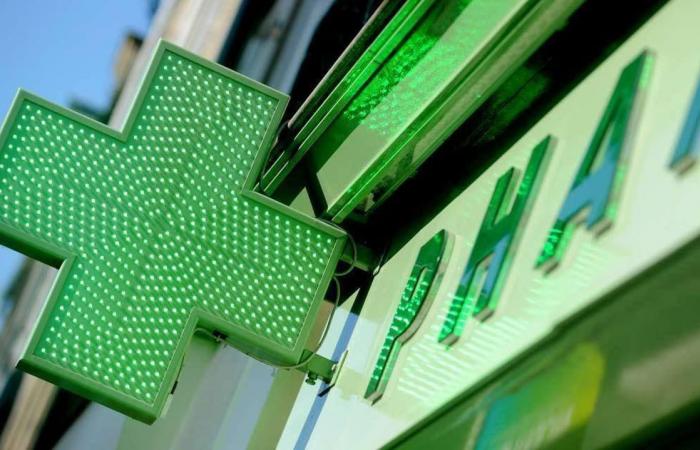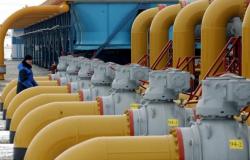From March 2021 to December 31, 2024, more than 1,500 healthcare professionals took part in the experiment on the delivery of therapeutic cannabis to some 2,000 patients in France. Among them, Bernard Pénicaud, head of the Rocade pharmacy, in Niort.
“We are aimed at people who have serious pathologies”
In Deux-Sèvres, only two pharmacies have been authorized to order and dispense medical cannabis: that of l'Olivier, in Niort, and yours. What pushed you to volunteer when the experiment was launched in March 2021?
Bernard Pénicaud: “I had already worked on therapeutic cannabis as part of my thesis, in 1983. At the time, it was not a current subject. It was rather innovative, but there were already laboratories which were beginning to test and imagine the therapeutic effects of this plant. »
When we talk about medical cannabis, we are talking about a medicine. It has nothing to do with cannabis that you buy illegally and which can be harmful to your health.
Bernard Pénicaud, pharmacist Niort
Can you say more about these effects, knowing that the experiment only involved 2,000 patients in France?
“Yes, we must remember that this is a medical experiment, that is to say that we are targeting people who suffer from serious pathologies, such as Parkinson's disease or multiple sclerosis. Cannabis-based therapies are not a cure, but they can soothe pain, limit spasms and combat nausea and vomiting, particularly in the case of patients undergoing chemotherapy. As part of the experiment, we used six medications, present in the form of oils or dried flowers, to be vaporized or inhaled. »
Despite the end of the experiment, the 2,000 patients who took part, including one from Niort, will be able to continue their treatment with medical cannabis until June 30, 2025.
© (Photo by Pixabay)
During the almost four years that the experiment lasted, you never delivered a single cannabinoid-based treatment. How do you explain it?
“One of the explanations is that there is no prescription place in Deux-Sèvres. You should know that the pharmacies which participated in the experiment do not have cannabis-based products on the shelves. It is up to the prescribing doctor, himself trained, to inform the pharmacist that he is going to dispense a prescription for one of the medications on the list. This gives us time to order the product before treating the patient. But in Deux-Sèvres, there is no prescribing doctor. The closest are in the hospitals of La Rochelle, for painkillers, and Limoges and Poitiers for neurology. »
The 1is January 2025, the Minister responsible for Health declared that he wanted to “study” the question of the use of cannabis for therapeutic purposes in France, without however announcing concrete measures. Does this mean that the experiment was positive?
-“At this time, we have no official feedback on this experiment. What I can tell you is that after the experiment, the question that arises for our leaders is the following: do we decide to open up more or, on the contrary, to close the door to therapeutics? »
In Deux-Sèvres, two pharmacies participated in the experiment, following training focused on the products, their tolerance, the gradation of dosages as well as the forms and routes of administration.
© (Photo d’illustration NR)
In the European Union, around twenty countries have legalized the medical use of cannabis. Is France late?
“We were late, yes. I recall that in 1983, the year of my thesis, there were already bibliographical productions on the subject. More than forty years later, we are only at the experimental stage, it is incredible. But it must also be said that the countries you are talking about do not have the same policy as France on the recreational use of cannabis. »
Can the potential generalization of THC-based treatments constitute a step towards the legalization of recreational cannabis, as its detractors fear?
“When we talk about medical cannabis, we are talking about a medicine. The two words, « cannabis » et “therapeutic”are intimately linked. It has nothing to do with cannabis that you buy illegally and which can be harmful to your health. In the case of medical cannabis, the level of THC – the psychoactive part of the plant – is under medical control. Moreover, these products can only be prescribed and dispensed by trained doctors and pharmacists. »
What is your position on the debate surrounding the legalization of recreational cannabis?
“It must be said again that more than a million French people regularly consume cannabis. We must take a pragmatic look at this situation, which is that thousands of French people are sent every day to frequent mafia networks and maintain parallel networks. So what do we do? I don't have the answer. It is up to national elected officials to position themselves. But I consider that the current repressive system is no longer in line with reality. »
Learn more
In Deux-Sèvres, a second pharmacy took part in the experimentation with medical cannabis: that of l'Olivier, in Niort. “We carried out the training at the request of one of our patients, suffering from a neurodegenerative pathology”testifies one of the managers of the establishment. Working at Poitiers University Hospital, the prescribing doctor considered that medical cannabis could “avoid worsening of the disease” of this Niortais, this “no traditional therapeutic treatment” had not managed to do beforehand. “Far from being revolutionary”medical cannabis has made it possible to “relieve muscle pain”reports the pharmacist, who remains awaiting the publication of a report on the experiment.







